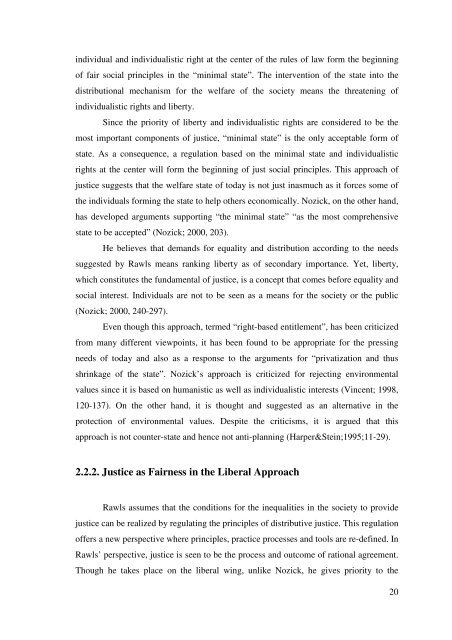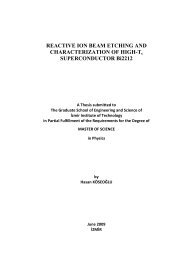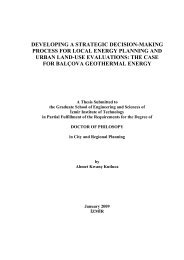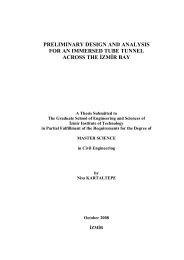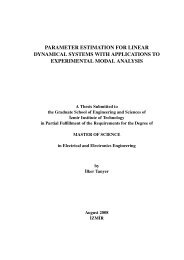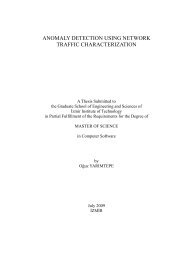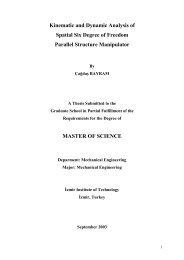a critical evaluation on the concept of justice in planning process
a critical evaluation on the concept of justice in planning process
a critical evaluation on the concept of justice in planning process
You also want an ePaper? Increase the reach of your titles
YUMPU automatically turns print PDFs into web optimized ePapers that Google loves.
<strong>in</strong>dividual and <strong>in</strong>dividualistic right at <strong>the</strong> center <strong>of</strong> <strong>the</strong> rules <strong>of</strong> law form <strong>the</strong> beg<strong>in</strong>n<strong>in</strong>g<br />
<strong>of</strong> fair social pr<strong>in</strong>ciples <strong>in</strong> <strong>the</strong> “m<strong>in</strong>imal state”. The <strong>in</strong>terventi<strong>on</strong> <strong>of</strong> <strong>the</strong> state <strong>in</strong>to <strong>the</strong><br />
distributi<strong>on</strong>al mechanism for <strong>the</strong> welfare <strong>of</strong> <strong>the</strong> society means <strong>the</strong> threaten<strong>in</strong>g <strong>of</strong><br />
<strong>in</strong>dividualistic rights and liberty.<br />
S<strong>in</strong>ce <strong>the</strong> priority <strong>of</strong> liberty and <strong>in</strong>dividualistic rights are c<strong>on</strong>sidered to be <strong>the</strong><br />
most important comp<strong>on</strong>ents <strong>of</strong> <strong>justice</strong>, “m<strong>in</strong>imal state” is <strong>the</strong> <strong>on</strong>ly acceptable form <strong>of</strong><br />
state. As a c<strong>on</strong>sequence, a regulati<strong>on</strong> based <strong>on</strong> <strong>the</strong> m<strong>in</strong>imal state and <strong>in</strong>dividualistic<br />
rights at <strong>the</strong> center will form <strong>the</strong> beg<strong>in</strong>n<strong>in</strong>g <strong>of</strong> just social pr<strong>in</strong>ciples. This approach <strong>of</strong><br />
<strong>justice</strong> suggests that <strong>the</strong> welfare state <strong>of</strong> today is not just <strong>in</strong>asmuch as it forces some <strong>of</strong><br />
<strong>the</strong> <strong>in</strong>dividuals form<strong>in</strong>g <strong>the</strong> state to help o<strong>the</strong>rs ec<strong>on</strong>omically. Nozick, <strong>on</strong> <strong>the</strong> o<strong>the</strong>r hand,<br />
has developed arguments support<strong>in</strong>g “<strong>the</strong> m<strong>in</strong>imal state” “as <strong>the</strong> most comprehensive<br />
state to be accepted” (Nozick; 2000, 203).<br />
He believes that demands for equality and distributi<strong>on</strong> accord<strong>in</strong>g to <strong>the</strong> needs<br />
suggested by Rawls means rank<strong>in</strong>g liberty as <strong>of</strong> sec<strong>on</strong>dary importance. Yet, liberty,<br />
which c<strong>on</strong>stitutes <strong>the</strong> fundamental <strong>of</strong> <strong>justice</strong>, is a c<strong>on</strong>cept that comes before equality and<br />
social <strong>in</strong>terest. Individuals are not to be seen as a means for <strong>the</strong> society or <strong>the</strong> public<br />
(Nozick; 2000, 240-297).<br />
Even though this approach, termed “right-based entitlement”, has been criticized<br />
from many different viewpo<strong>in</strong>ts, it has been found to be appropriate for <strong>the</strong> press<strong>in</strong>g<br />
needs <strong>of</strong> today and also as a resp<strong>on</strong>se to <strong>the</strong> arguments for “privatizati<strong>on</strong> and thus<br />
shr<strong>in</strong>kage <strong>of</strong> <strong>the</strong> state”. Nozick’s approach is criticized for reject<strong>in</strong>g envir<strong>on</strong>mental<br />
values s<strong>in</strong>ce it is based <strong>on</strong> humanistic as well as <strong>in</strong>dividualistic <strong>in</strong>terests (V<strong>in</strong>cent; 1998,<br />
120-137). On <strong>the</strong> o<strong>the</strong>r hand, it is thought and suggested as an alternative <strong>in</strong> <strong>the</strong><br />
protecti<strong>on</strong> <strong>of</strong> envir<strong>on</strong>mental values. Despite <strong>the</strong> criticisms, it is argued that this<br />
approach is not counter-state and hence not anti-plann<strong>in</strong>g (Harper&Ste<strong>in</strong>;1995;11-29).<br />
2.2.2. Justice as Fairness <strong>in</strong> <strong>the</strong> Liberal Approach<br />
Rawls assumes that <strong>the</strong> c<strong>on</strong>diti<strong>on</strong>s for <strong>the</strong> <strong>in</strong>equalities <strong>in</strong> <strong>the</strong> society to provide<br />
<strong>justice</strong> can be realized by regulat<strong>in</strong>g <strong>the</strong> pr<strong>in</strong>ciples <strong>of</strong> distributive <strong>justice</strong>. This regulati<strong>on</strong><br />
<strong>of</strong>fers a new perspective where pr<strong>in</strong>ciples, practice <strong>process</strong>es and tools are re-def<strong>in</strong>ed. In<br />
Rawls’ perspective, <strong>justice</strong> is seen to be <strong>the</strong> <strong>process</strong> and outcome <strong>of</strong> rati<strong>on</strong>al agreement.<br />
Though he takes place <strong>on</strong> <strong>the</strong> liberal w<strong>in</strong>g, unlike Nozick, he gives priority to <strong>the</strong><br />
20


